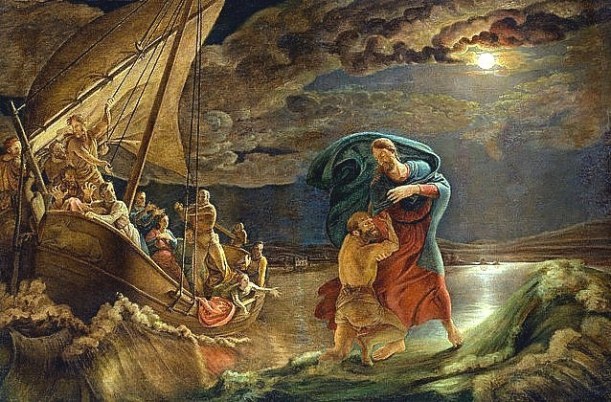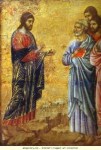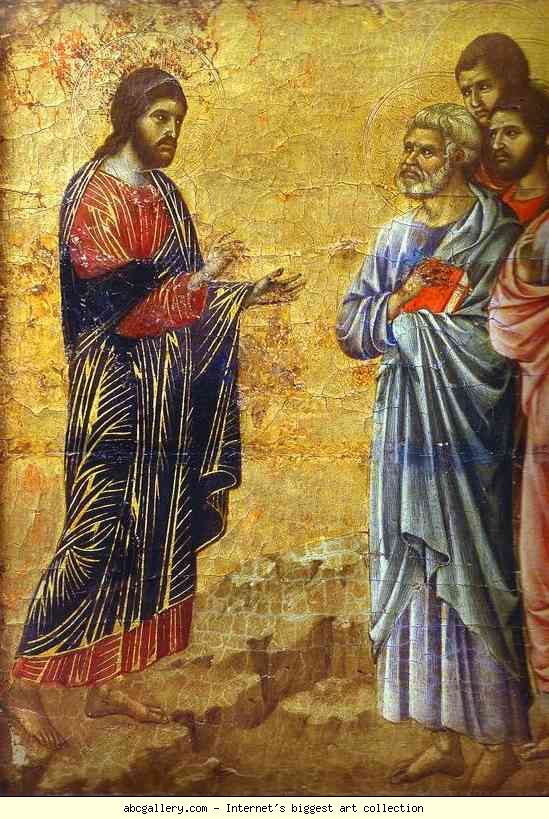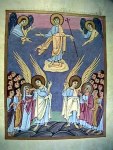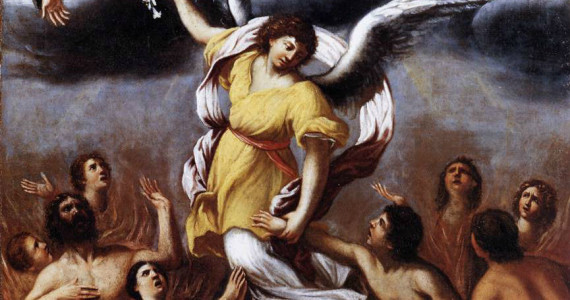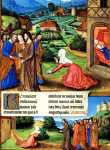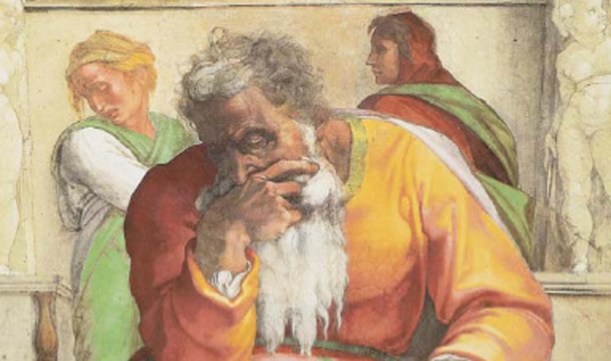
Jeremiah (detail), 1508-1512, Michelangelo Buonarotti, fresco, Sistine Chapel, Vatican City.
Heard these slogans?
Tell me again? How does my gay marriage affect you?
OR
Don’t like my gay marriage? Don’t get one.
The activists who dream up these slogans are relying on people being either ignorant or credulous. Fortunately the Australian public are cleverer than that, and there are plenty of examples showing how a redefinition of marriage might affect Australians. In this post, I want to provide examples of the curtailments to freedom of speech and freedom of association that have arisen, either already in this country, or following the redefinition of marriage, in other countries. There is still time for Australians to petition their members of parliament about the likely outcomes, whichever way the vote goes in the (so-called) plebiscite.
Despite all the claims, almost all discrimination in respect of same-sex couples has already been removed – in fact the Gay and Lesbian Rights Lobby themselves admit this in their Invited Submission to the Standing Committee on Social Policy and Legal Affairs on the Marriage Amendment Bill 2012 and the Marriage Equality Amendment Bill 2012.
where they say,
In 2008, the Federal Government made a commitment to ending same-sex relationship discrimination and amended 85 federal laws to recognise same-sex de facto couples [my bold]…
At a state and territory level, in the space of seven years (1999-2006), de facto recognition has expanded comprehensively to guarantee the rights of same-sex couples in state laws. At the end of 2008, the Federal Government passed a series of reforms to largely mirror the recognition offered by states and territories. Same-sex couples were recognised in taxation, parenting, superannuation, veteran’s affairs, social security and immigration laws. The effect of the reforms was to give same-sex couples the same rights, entitlements and responsibilities as heterosexual de facto couples.
(Gay and Lesbian Rights Lobby All Love is Equal Submission 2012)
We now need to look at what will happen to the rights of everyone who disagrees with changing the definition of marriage – particularly those who are committed to religious beliefs regarding the nature of marriage. These particular areas are most likely to be affected if comprehensive religious freedoms are not protected by law – to all citizens, not just clergy: Christians may be slapped with a court order or fined for refusing material cooperation with the new laws. They may also be compelled to pay damages to individuals who feel offended, including their court costs. They may be refused employment positions or lose accreditation because of their religious beliefs. In the examples below, I will list some cases of infringements to religious liberty that have already occurred both overseas and in Australia, and I divide these into five subject headings: compelled association, compelled provision of benefits, speech punishment, de-accreditation and loss of employment, and removal of tax concessions.
- COMPELLED ASSOCIATION
This includes situations such as government compulsion of religious bodies to retain as employees (or members), staff who – in direct conflict with ethics code of the organisation – take part in a same-sex ‘wedding’; the compulsory provision of services to same-sex ‘couples’ by businesses involved in the provision of wedding-related or spousal-related goods and services, or the enforcement by the State of children attending classes in highly contentious gender ideology.
- 2008. Christian doctors, Dr Douglas Fenton and Dr Christine Brody, were found by the California State Supreme Court to have violated California’s Unruh Civil Rights Act, when they refused to provide intrauterine insemination to a lesbian woman.
- 2016. The Ontario Superior Court of Justice ruled, in E.T. v. Hamilton-Wentworth District School Board, that Steve Tourloukis could not remove his children from the radical sex education programs being conducted at their school.
- 2013. MP Alex Greenwich introduced a bill (which was ultimately unsuccessful) to remove the exemption in the Anti Discrimination Act 1977 (NSW) which allows religious schools to engage staff with beliefs consistent with the values of the school.
- 2014. Donald and Evelyn Knapp, of The Hitching Post Wedding Chapel, fell foul of the antidiscrimination ordinance of the City of Coeur d’Alene, Idaho which stated that its purpose was ‘to prohibit discrimination in housing, employment and public accommodation based upon sexual orientation and gender identity/expression and providing that a violation of this ordinance is a misdemeanour punishable by a fine of up to $1,000 or by imprisonment not to exceed 180 days or both.’ – and this fine was for each day they continued in their non-cooperation. Their crime was to decline to perform same-sex weddings.
- 2012. A same-sex couple filed a complaint with the Colorado Civil Rights Commission against Jack Phillips, of the Masterpiece Cake Shop, when he declined to make them a wedding cake.
An administrative law judge ruled against Jack in December 2013, saying that designing and creating cakes for same-sex wedding ceremonies are not speech protected by the First Amendment. The commission also ordered Jack and his staff to design cakes for same-sex wedding celebrations, go through a “re-education” program, implement new policies to comply with the commission’s order, and file quarterly “compliance” reports for two years to show that Jack has completely eliminated his religious beliefs from his business. (Alliance Defending Freedom)
- 2013. Aaron and Melissa Klein, of Sweet Cakes by Melissa, declined to create a wedding cake for a lesbian couple and were ordered to pay restitution of $135,000 by the Oregon Bureau of Labor and Industries. Their company went out of business.
- 2016. Lorie Smith, of 303 Creative Graphic and Web Design, is a graphic designer who wants to be able to create work consistent with her core beliefs. A ‘Colorado law would force her to create websites celebrating marriages that violate her deeply held religious beliefs if she creates websites celebrating one-man, one-woman marriages. The law even bars her from expressing her religious views about marriage on her website. ADF is filing a lawsuit on Lorie’s behalf asking a Colorado court to prevent government officials from enforcing the law against Lorie so she can run her business consistently with her faith without fear of government punishment.’ The Alliance Defending Freedom is proceeding with a pre-enforcement challenge to help Lorie obtain a ruling about whether she would be liable for the penalty of $500 per violation, including investigations and court costs, and mandated re-education programs, which the current law requires.
- 2006. Jonathan and Elaine Huguenin, of Elane Photography, were asked by Vanessa Willock to film her same-sex wedding. They declined. Ms Willock filed a complaint with the New Mexico Human Rights Commission. The Supreme Court ruled against the Huguenins. They were fined nearly $7,000.
- 2017. 72-year old Baronnelle Stutzman, owner of Arlene’s Flowers, Richland, Washington, is being sued by Washington State and the ACLU because she refused to make a wedding cake for the same-sex wedding of a long time customer, Rob Ingersoll. In February 2017, the Washington Supreme Court ruled against her. She stands to lose in the region of a million dollars in her battle with the ACLU.
- 2005. Dr Neil Clark Warren’s online dating service, eHarmony, was sued by Eric McKinley of New Jersey, for failing to provide dating services to same-sex attracted men. eHarmony agreed to pay restitution to McKinley of $5,000 plus a year’s free membership. They were also required to restructure their business to include opportunities for same-sex dating and include pictures of same-sex couples on their website. Further to this, eHarmony was sued in California by a lesbian woman, Linda Carlson, in 2007, for a similar reason.
- 2006. Catholic Charities of Boston MA, Catholic Charities of Rockford IL, closed down their adoption services due to the conflict between faithfulness to Church teaching and the requirements of State law.
- 2005. David and Tanya Parker of Lexington, MA, requested from their son’s school that they be notified when their 6-year old son was going to be exposed during class to homosexual curriculum materials. David was arrested for trespass during a meeting with the principal and Director of Education. He was held overnight in jail, and not given permission to call his lawyer. The episode was followed by court appearances, vilification by LGBT activists and the non-resolution of his complaint. In 2006, David’s son, Jacob, was surrounded at recess, and beaten and punched in a mass-assault by a group of children from the school.
- COMPELLED PROVISION OF BENEFITS
In this scenario, the government compels religious institutions to include same-sex ‘marriage’ partners in any schemes involving benefits to traditionally married couples.
- Yeshiva University limits its married housing facilities to students who are married. In 2001, prior to the legalisation of same-sex marriage in New York State, the university was fined in Levin v. Yeshiva University for declining to provide Sara Levin and her partner accommodation in the housing reserved for married couples.
- PUNISHMENT FOR SPEECH
Merely expressing opposition to same-sex ‘marriage’, becomes punishable by law. Public and private preaching, political activism or even conversation might be construed as ‘hate speech’, ‘harassment’ or ‘discrimination’.
- 2014. The Mayor of Houston, Annise Parker, subpoenaed sermons which mentioned gender identity or homosexuality.
- 2015. Transgender advocate and Greens candidate, Martine Delaney, lodged a complaint with the Tasmanian Anti-Discrimination Commissioner, in respect of Archbishop Julian Porteous and the Australian Catholic Bishops’ pastoral letter, Don’t Mess With Marriage. She claimed that the material in the pamphlet contravened the Anti-Discrimination Act 1998 (Tas). Ms Delaney subsequently withdrew her complaint, but not before a large amount of money and time had been spent preparing a defence.
- 2016. Four Spanish Bishops, Juan Antonio Reig Pla, Joaquín María López, José Rico Pavés and Demetrio Fernández are being threatened with prosecution by LGBT activists for criticising Madrid’s new law with the cumbersome name, Law of Integral Protection against LGRBIphobia and Discrimination for Reasons of Orientation and Sexual Identity. The law attempts to prohibit speech concerning homosexuals and transsexuals which might be regarded as discriminatory or offensive.
- 2016. Cardinal Antonio Cañizares, Archbishop of Valencia, was charged under article 510 of the Penal Code for publicly fomenting hostility towards the LGBT movement, when he said, “We have legislation contrary to the family, the acts of political and social forces, to which are added movements and acts by the gay empire, by ideologies such as radical feminism, or the most insidious of all, gender ideology.” The charges were later dismissed by the Superior Tribunal of Justice.
- DE-ACCREDITATION AND REMOVAL OF LICENSES; LOSS OF EMPLOYMENT OR BOARD POSITIONS
Members of professional associations and Businesses which do not acknowledge same-sex ‘marriage’ may have their accreditation revoked, or people who support traditional marriage and oppose same-sex marriage may lose their jobs or be subjected to vitriolic social media campaigns.
- 2017. IBM Managing Partner, Mark Allaby, was targeted because of his association with the Lachlan Macquarie Institute, which provides internships to high achieving Christians pursuing careers in politics, law, journalism, research and the public service. A social media campaign involving a barrage of LGBT-lobby organised twitter messages, forced Mr Allaby off the board of the Australian Christian Lobby. Mr Allaby was also forced to resign his position from the board of PwC (Price Waterhouse Coopers), following a social media campaign.
- 2017. The private Jewish Orthodox Vishnitz Girls’ School, in Hackney, North London, is facing closure because of its refusal to teach radical gender theory, gender reassignment surgery and homosexual content to the young ladies who are aged between three and eight years old. It has failed its Ofsted Inspection three times in the past two years – an inspection which compels compliance with the Equality Act 2010. In England, schools which do not meet Ofsted Standards will be de-accredited as independent schools.
- 2014. Brendon Eich, the creator of the JavaScript programming language, and CEO of Mozilla Corporation, made a donation in support of the Californian anti-same-sex marriage law, Proposition 8. Following a media firestorm, he resigned from his position with Mozilla in April 2014.
- 2015. Atlanta Fire Chief, Kelvin Cochrane, was suspended without pay and ultimately fired, because of a book on Biblical morality that he had written for his men’s Bible Study group in his Baptist Church.
- 2017. Tim and Melanie Cooper, Directors of Coopers Brewery, following the release of the Bible Society’s ‘Keep it Light’ video in which their Beer was being drunk by two members of Parliament engaged in a friendly chat about the two sides of the same-sex marriage debate, eventually bowed to the over-the-top social media campaign to destroy their brand, and released a statement in support of ‘diversity and equality’.
- According to Miranda Devine of The Daily Telegraph, ‘Christian employees of organisations which have signed up to the same sex marriage campaign, now feel frightened and intimidated at work. Some have anonymously contacted the ACL and Marriage Alliance and the few journalists they feel might take their concerns seriously. One Telstra employee says: “Even though I declined to attend the “Wear It Purple” Day meeting, I have since been re-sent the meeting invite by an Executive Director 6 times. The meeting invite says staff are “required” (not “optional”) attendees.” One former Qantas pilot says: “What caused me to resign is the company’s… active campaigning for the redefinition of marriage. [There] was a cultural pressure to conform, from the internal media and company culture. “We’d be sitting in our cockpit, and receive an email expecting something operational, only to find it was another email about the [LGBTIQ] agenda. We were bombarded with this stuff. “We got at times 4 emails a week about it. I knew I had to go, because I didn’t belong there… People are so afraid of being shouted down as a bigot.”’
- Twelve Catholic Adoption Agencies in England (including Catholic Care) have been forced to close down in England since the introduction of the Adoption of Children (Scotland) Act 2007, due to the commitment of Catholic Adoption Agencies to place children with heterosexual couples only.
- 2012. The group Christian Concern arranged to hold a conference titled, One Man, One Woman: Making the case for marriage for the good of society at a venue owned by The Law Society, the representative body for solicitors in the UK. The Law Society subsequently cancelled the booking, citing ‘diversity policies’ as a reason. A rescheduled booking with the QEII Conference Centre was also cancelled the day before the conference, for the same reason. Christian Concern sued both parties for breach of contract, and an agreement was subsequently reached
- 2012. The Chief Rabbi of Amsterdam, Aryeh Ralbag, was temporarily suspended from his position after signing a document that restated the orthodox Jewish position on homosexuality, calling on leaders to ‘guide same-sex strugglers towards a path of healing and overcoming their sexual inclinations’.
- 2012. Kuruvilla George, the Deputy Chief Psychiatrist was pressured to resign from his position on the Victorian Human Rights and Equal Opportunities Commission, following his signing of a petition against same-sex marriage drafted by Doctors for the Family and signed by 170 doctors. The petition stated that natural families were the most conducive to happiness for children and, citing numerous academic peer-reviewed research papers, suggested that families with same-sex parents were not ideal for raising children.
- 2015. A Catholic psychologist, Philip Pocock, was barred from practising in the ACT, even though no patients had complained against him. Pocock had stated that sodomy and masturbation were acts that were distortions of sexuality.
- 2015. The Law Society of Upper Canada has refused the accreditation of Trinity Western University’s Law School, because the University insists that sexual intimacy should occur only within the bounds of heterosexual marriage.
- 2017. The Catholic non-profit organisation tackling the effects of family breakdown, The Ruth Institute, has been targeted by the Southern Poverty Law Center as a ‘hate group’, because of its teaching of Catholic Doctrine. The inclusion of The Ruth Institute on the SPLC’s ‘hate map’, has prompted The Ruth Institute’s online payment provider, Vanco Payment Solutions, to withdraw their provision of services.
- 2017. Sydney doctor, Pansy Lai, was subjected to vicious social media attacks when she participated in an advertisement for the Marriage Coalition presenting the case for the no vote in the Australian plebiscite on the redefinition of marriage. A petition facilitated by the leftist activist group, GetUp!, to have Dr Lai deregistered by the Australian Health Practitioner Regulation Authority gathered around 5,000 votes before it was pulled by GetUp!, after they realised they were damaging their own brand.
- EXCLUSION FROM GOVERNMENT FUNDING AND TAX CONCESSIONS
Tax-free status and government funding or grants might be withdrawn from organisations which uphold the traditional definition of marriage.
- The Evangelical Child and Family Agency in Illinois was at risk of closure due to the removal of State funding several years ago for agencies which refused to allocate adoptees to same sex couples; however, it seems they have had an alternate source of funds and still specify on their website that potential applicants must be male and female.
- 2007. The Methodist-run Ocean Grove Camp Meeting Association, lost its eligibility for a real estate tax exemption because it had declined permission for two lesbian couples to celebrate their civil unions at the Boardwalk Pavilion on their New Jersey property.
This is by no means a comprehensive list, but I hope it gives a sufficient tour of the post-marriage-redefinition landscape to give legislators pause.
May the Holy Spirit in his mercy bless Australia with wisdom and a love of truth. And may I not have to say with Jeremiah in today’s first reading,
I am a daily laughing-stock,
everybody’s butt.
Each time I speak the word, I have to howl
and proclaim: ‘Violence and ruin!’
The word of the Lord has meant for me
insult, derision, all day long.
I used to say, ‘I will not think about him,
I will not speak in his name anymore.’
Then there seemed to be a fire burning in my heart,
imprisoned in my bones.
(Jeremiah 20:7-9)



